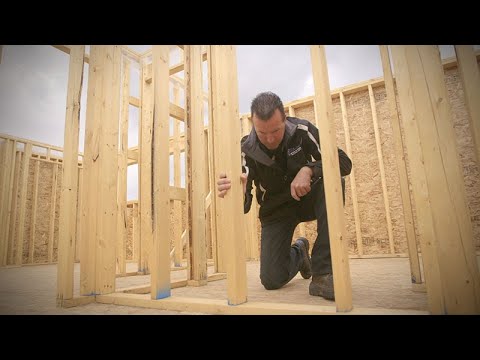Career Overview
Construction inspectors inspect and examine buildings, bridges, highways and construction sites to ensure that specifications, building codes and safety regulations are observed.
People in this occupation:
- Are employed by federal, provincial and municipal governments; construction and real estate companies; and architectural and civil engineering consulting firms, and may also be self-employed
- Have a wide range of knowledge of construction techniques, building codes and standards
- Must be well organized and analytical, and have the ability to communicate information clearly and precisely
- Should have good mathematical skills
Job Titles
Duties
Construction inspectors:
- Examine plans, drawings and site layouts for new buildings, building renovations and other proposed structures
- Inspect construction of buildings, bridges, dams, highways and other structures for conformance to drawings, specifications, building codes or other applicable acts and standards regulating construction
- Inspect and test electrical or plumbing installations in buildings to ensure compliance with municipal, provincial and federal regulations
- Inspect steel framework, reinforcing steel mesh and rods, concrete forms or pre-stressed concrete to ensure quality standards and to verify conformance to specifications and building codes
- Inspect construction sites to ensure that safe working conditions are maintained
- Inspect existing buildings to identify and report on structural defects, fire hazards and other threats to safety
- Inspect new or resale homes on behalf of clients and assess and provide reports on the physical condition of property
Building inspectors:
Building inspectors are local government officials primarily involved in new construction and renovation. They are members of the Building Officials’ Association of BC and many also belong to the Plumbing Officials’ Association of British Columbia and perform plumbing inspections. Workers in this occupation:
- Ensure compliance with the structural as well as health and safety requirements as outlined by local government by-laws, the BC Building Code, BC Fire Code and other related acts and standards
- Keep diligent records of the project and co-ordinate with contractors, engineers, other professionals and agencies
- Assist applicants with the permit process
Home and property inspectors:
Home and property inspectors primarily work on existing structures for the private and real estate sector. Workers in this occupation:
- Inspect buildings to identify and report on structural defects and possible deterioration since construction
- Report on the condition of a home’s systems, components and structure (e.g., roofing, plumbing, electrical wiring, and heating or cooling systems)
- Assess the physical condition of the property where the home is located and provide detailed reports on the property and house being inspected, including a comprehensive checklist of the home’s condition
Registered fire protection technicians:
- Visit construction sites and inspect work that is in progress
- Inspect construction projects to ensure compliance with safety regulations, with fire safety as the primary concern
- Inspect fire sprinklers, alarms, smoke control systems and fire exits
- Assess adjoining buildings to determine any risks posed by the type of construction, building contents and fire protection equipment
- Enforce laws pertaining to the fire safety status of buildings and instruct violators of fire regulations to comply with codes, obtain permits and submit to further inspections
- Provide information to the public and conduct education and information sessions about the fire code and fire safety and prevention
Construction safety officers:
- Make scheduled and unscheduled visits to construction sites to assess the safety of the work environment
- Reinforce universal safety measures, ensuring that protective clothing, such as hard hats, goggles, ear protection and steel-toed footwear, is worn
- Make supervisors and workers aware of potentially hazardous situations
- Observe the construction, repair and maintenance of highways, bridges, dams and other types of building and engineering projects to ensure the safety of workers
- Provide information to the public
Earnings
Earnings is income that workers receive in exchange for their labour. Depending on the type of employment, earnings can be in the form of wages (hourly), salaries (fixed monthly or annual) or self-employed earnings.
Work Environment
# Workers Employed
2,475% Employed Full Time
65%Construction inspectors typically work a regular 40-hour week. However, overtime may be required to complete projects and meet deadlines, and some inspectors may have a varied work schedule that includes weekends and evenings.
Construction inspectors spend a portion of their work day visiting construction sites (which can be noisy and dirty) and field offices. Some work sites are located outdoors, exposing workers to various weather conditions.
Although the work is generally not considered hazardous, inspectors wear hard hats and follow proper safety measures while on a construction site. They may also be required to work from ladders or crawl in tight spaces.
Additional hazards for fire protection technicians may include electrical shocks and exposure to hazardous chemicals, but following safety procedures reduces the risks.
Career Pathways
Municipal and regional district building inspectors are generally members of the Building Officials’ Association of BC (BOABC), the certifying body for municipal inspectors and code professionals.
Inspectors gain certification as level 1, level 2 and level 3 building inspectors through a series of study sessions, exams and experience.
- The complexity of the building dictates the certification level required for inspection; for example, a 10-storey, mixed-use building would require a level 3 building inspector. A level 3 building inspector is considered a semi-professional and is entitled to RBO (Registered Building Official) designation
- Municipal and regional district plumbing inspectors are generally members of the Plumbing Officials’ Association of British Columbia (POABC). The POABC offers education and certification of level 1 and level 2 plumbing inspectors
With experience, construction inspectors can also advance to supervisory positions or start their own businesses.
Occupational Interests
It’s important to understand what kinds of occupations align with your interests.
For more about occupational interests visit Skills for the Future Workforce > Characteristics.
Here are the top occupational interest(s) for this career profile:
Education, Training and Skills
Construction inspectors are typically required to have completed secondary school. Other training may include:
- Post-secondary education in construction, civil engineering or architectural technology
- Entry-level training courses and programs in construction safety, fire protection and home and property inspection, which can range in length from one day to two years
Several years of experience as a qualified tradesperson in a construction trade such as plumbing, carpentry or electrical may also qualify a person to become a construction inspector.
Professional certification as a property inspector, construction inspector or construction safety officer requires a combination of work experience and academic training. Certification can be obtained through the Applied Science Technologists and Technicians of British Columbia (ASTTBC) or through various industry organizations such as the Canadian Association of Home and Property Inspectors (CAHPI).
Building inspectors are required to complete the level 1 building inspector course, endorsed by the Building Officials’ Association of BC.
In Vancouver, North Vancouver City, North Vancouver District, Squamish, Chilliwack, Richmond, Sechelt, Courtenay, Whistler, Abbotsford and Surrey, Pitt Meadows and Coquitlam, municipal bylaws require fire protection technicians to be certified and registered through the ASTTBC Fire Protection Certification Program.
For more information on training and certification, please see the ASTTBC website at http://www.asttbc.org.
Education programs in B.C.

Top Skills
Every job calls for a certain set of skills. Knowing those skills is the first step in finding a good career fit.
Here, you will find the 10 most relevant workplace skills. Some are more important to achieving success in a certain career than others. These skills may come naturally to you or you may need to gain them through education, training and experience.
See the list of work-related skills below, ranked in order of importance for this career. Check out the list and see if this career matches your skills—take that first step!
Understanding written sentences and paragraphs in work-related documents.
Using logic and reasoning to identify the strengths and weaknesses of alternative solutions, conclusions or approaches to problems.
Talking to others to share information effectively.
Giving full attention to what other people are saying, taking time to understand the points being made, asking questions as appropriate, and not interrupting at inappropriate times.
Considering the relative costs and benefits of potential actions to choose the most appropriate one.
Communicating effectively in writing as appropriate for the needs of the audience.
Being able to solve novel, ill-defined problems in complex, real-world settings.
Using mathematics to solve problems.
Keeping track of and assessing your performance, other individuals, or organizations to make improvements or take corrective action.
Identifying measures or indicators of system performance and the actions needed to improve or correct performance, while meeting the goals of the system.
Labour Market Statistics
Discover data, facts and information that have been gathered and analyzed. Learn about the characteristics of the economy and labour market in B.C.
Employment
Find out about employment types and trends by region and industry.
Employment
2,475Employment by Region







| Region | Employment | % Employment of this Occupation |
|---|---|---|
| Cariboo | 85 | 3.4% |
| Kootenay | 125 | 5.0% |
| Mainland/Southwest | 1,430 | 57.7% |
| North Coast and Nechako | 60 | 2.4% |
| Northeast | 90 | 3.6% |
| Thompson-Okanagan | 365 | 14.7% |
| Vancouver Island/Coast | 325 | 13.1% |
Labour Market Outlook
The B.C. Labour Market Outlook is a 10-year forecast of the expected supply and demand for labour in the province. It’s usually updated every year. The purpose is to provide British Columbians with the knowledge to make informed decisions on careers, skills training, education and hiring.
Forecasted Job Openings (2025-2035)
1,260Forecasted Job Openings
Forecasted Employment Growth Rate
Composition of Job Openings
Job Openings by Region (2025-2035)







| Region | Job Openings | Avg. Annual Employment Growth |
|---|---|---|
| Cariboo | 10 | -0.4% |
| Kootenay | 60 | 0.5% |
| Mainland/Southwest | 730 | 1.3% |
| North Coast and Nechako | 0 | -0.3% |
| Northeast | 20 | 0.2% |
| Thompson-Okanagan | 180 | 0.6% |
| Vancouver Island/Coast | 250 | 1.9% |
Industry Highlights
Learn about the opportunities in B.C.'s major industries, including employment trends, earning potential, locations of work and more.
Forecasted Job Openings by Industry
| Industry | Job Openings (2025-2035) |
|---|---|
| Construction | 400 |
| Professional, Scientific and Technical Services | 390 |
| Public Administration | 300 |
| Mining and Oil and Gas Extraction | 50 |
| Finance, Insurance and Real Estate | 40 |
Insights from Industry
All new job openings are expected in response to the need to replace retiring workers.
Although the majority of construction inspectors are employed in the Public Administration and Professional Business Services industries, demand is driven by the Construction industry. Government funding for capital projects could be an important source of construction employment. Growth in construction activities will support demand for construction inspection services by both local governments and private buyers.
In addition, growing concerns about public safety and building quality in the aftermath of the “leaky condo” problems have resulted in changes to the building code, which have increased the demand for inspection services. Building inspection services for prospective home buyers is a growing source of employment.
Resources
-
Applied Science Technologists and Technicians of BC (ASTTBC)www.asttbc.org
-
BuildForce Canadawww.buildforce.ca/en
-
Plumbing Officials’ Association of British Columbiaboabc.org
-
Canadian National Association of Certified Home Inspectors (CanNACHI)www.cannachi.org
-
Fire Protection Technician Certification Program (RFPT)fireprotection.asttbc.org
-
Home Association Inspectors BC (HIABC)hiabc.ca
-
National Home Inspector Certification Council (NHICC)www.nationalhomeinspector.org
-
SkilledTradesBCskilledtradesbc.ca/








